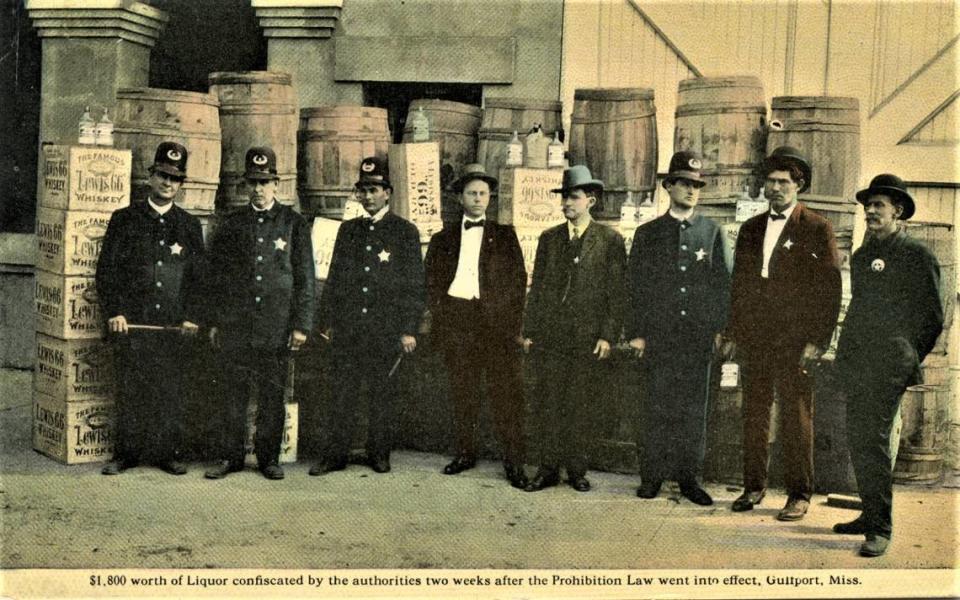Why did Prohibition last so long in Mississippi, and what happened on the Coast?
Mississippi was the last state to repeal Prohibition in 1966, yet some cities and counties still enforce a ban or limits on alcohol sales.
The state’s diverse and sometimes contradicting alcohol laws date back to the early 19th century, culminating in the state being the first to ratify the highly unpopular 18th Amendment.
The movement can be traced back to the pre-Civil War era, when the Mississippi State Temperance Society advocated for alcohol prohibition, joined later by the Sons of Temperance and Sisters of Temperance.
Following the Civil War, more forceful prohibition societies emerged, such as the Anti-Saloon League and the Woman’s Christian Temperance Union (WCTU). Harriet Kells of the WCTU, along with ministers James H. Gambrell and Charles B. Galloway, spearheaded efforts to ban alcohol sales in local communities.
Religious Ministers, such as Gambrell and Galloway, felt that alcohol led to self-indulgence, violence and sin. Other supporters argued that alcohol destabilized homes and ruined families.
Their influence led to the passage of a local-option law in 1907, which allowed counties the option to pass legislation to ban alcohol sales. Most counties in the state immediately took the opportunity to do so, with the exception of several portions of the Delta and the Coast.
However, the fight for state-wide prohibition continued, fueled by the belief that it would improve productivity and address Mississippi’s economic challenges.
Many prohibition leaders held racial beliefs that alcohol sales to African-Americans would endanger white women or hinder their productivity on farms. On the other side, some Black Mississippians advocated for prohibition as a matter of self-respect for their communities.
Mississippi bans alcohol sales
In 1908, the Mississippi legislature finally banned alcohol sales across the entire state, except for small allowances for medicinal purposes. While homemade wine was still permitted in some cases, those caught distilling or selling alcohol faced heavy fines and jail sentences.
On January 17, 1920, the 18th Amendment was passed by the federal government, and Mississippi — having been dry for over a decade — became the first to ratify it.
C. H. Alexander, the author of the 18th Amendment, celebrated the victory by exclaiming “nowhere has the victory been more marked and complete than in Mississippi, which, through a brave, honest, law-loving, home-loving legislature, drove the legalized traffic from the whole state.”
However, Prohibition did not completely deter alcohol consumption. Workers in the Mississippi Delta were mostly allowed to drink, as most farm owners wanted to keep their workers happy. Some Delta police departments initially refused to enforce Prohibition laws.
Under-the-table alcohol sales on the Gulf Coast
Meanwhile, the Gulf Coast saw under-the-table alcohol services at restaurants and resorts which became known as Blind Tigers. Out of state and foreign bootleggers and gangs transported illegal liquor into the region along the river or into the ports.
With such strict alcohol laws and a population still eager to drink, organized crime and murders became a major issue in cities like Biloxi.
Notably, Mississippians of all races cooperated in acquiring illegal alcohol from various sources. Famous figures like author William Faulkner and Blues artists such as Robert Johnson referenced Prohibition-era alcohol consumption in their works. Widespread illegal consumption led to Mississippi becoming known as “the wettest dry state” in the nation.
While some counties were more lenient than others, or even outright ignored the laws, some local law enforcement were heavy handed in enforcing Prohibition. Federal agents and local law officers cooperated in shutting down illegal alcohol ventures and handed out severe fines and jail sentences to offenders.

Repealing Prohibition
In 1933, the federal government repealed Prohibition, spurring widespread celebrations, but Mississippi continued to enforce it. Although the state’s residents voted overwhelmingly to repeal Prohibition in 1934 and 1952, the government remained resolute in retaining it.
The state even passed a controversial 10 percent sales tax on alcohol, forcing many residents to ponder the purpose of a tax on an illegal substance.
Debates on repealing Prohibition occurred in 1960 and 1964 but failed. Finally, in 1966, Governor Paul B. Johnson lifted the statewide ban, though local communities still had the power to determine their alcohol policies.
It wasn’t until January 1, 2021, when Governor Tate Reeves signed legislation that made alcohol consumption legal in every county, officially ending Prohibition in Mississippi.
Today, Mississippi’s alcohol laws remain diverse and, in some cases, peculiar. Several counties allow public consumption, while a few others do not even have an open container law. Contrarily, there are still 36 dry counties, some of which, interestingly, have wet cities that permit the sale of alcohol within city limits.

